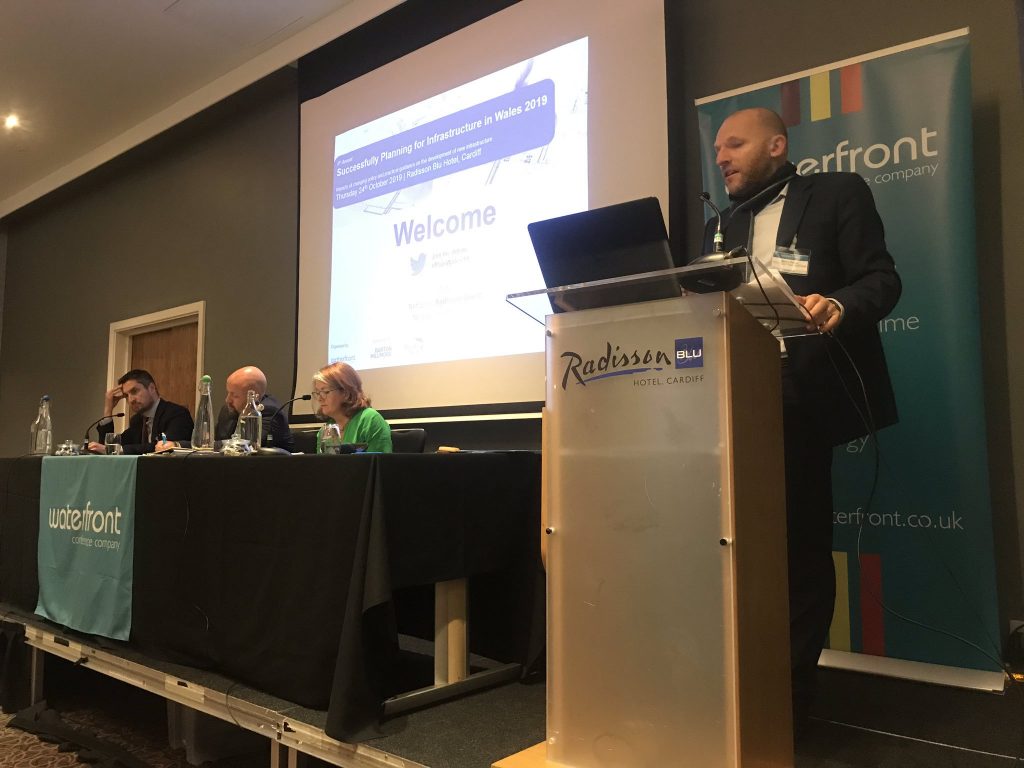
Looking to the Future: Why It’s Time to Get Everyone Involved in Wales’s ‘Decarbonisation Debate’
“Driving Sustainable Growth” was the key objective of Welsh Government’s 2017 economic action plan – Prosperity for All – but since its publication, a ‘Climate Emergency’ has been officially declared, along with a commitment to a ‘net zero’ target on carbon emissions by 2050. So, what’s changed?
Evolving our planning policies
As developers, planning experts and industry bodies gathered at a national conference in Cardiff this week (24th October) to debate the latest developments in strategic planning and development policy, there were lots of big questions on the agenda. How is Wales going to meet its carbon reduction targets and still make economic gains? Are proposed policy changes going to deliver the right projects at the right time?
As with most policy conferences, there was a fair amount of technical detail to cover. Multiple players with differing views and a degree of ‘skin in the game’ put their individual points across, but one consistent theme appeared to emerge. The need to improve public understanding of the important choices that need to be made and explain how policy decisions taken at various levels of government could impact on the way we all live our lives.

The National Development Framework for Wales
One key development in Welsh policy making that went under the microscope was the draft National Development Framework (NDF) – a 72-page, high-level document that aims to set the context for future development and planning decisions taken in Wales at local, regional and national level – that is currently out for consultation. Now, while we don’t want to pre-empt the outcome of the consultation, it is fair to say that voices within the industry have been somewhat sceptical.
Take the issue of renewable energy for example. Wales is a massive supporter of renewables – our position is as the 5th largest exporter of energy in the world and around half is generated from renewable sources. We have organisations working at the forefront of innovation and development and Freshwater’s role on Wales’s Cross-Party Group for Sustainable Energy has shown us the appetite and political will for growing this exciting sector. Ambitious Welsh Government targets call for 70% of all energy used in Wales to come from renewable sources by 2030.
While most of those gathered in Cardiff praised the Welsh Government’s ‘positive intentions’ towards renewables in the NDF, many expressed concerns around deliverability, while others questioned whether policy makers are actually prepared to make the “tough, sometimes unpopular choices” that are going to be needed if Wales is going to meet its targets on renewable energy and carbon emissions.
Businesses that invest in the renewables sector, many of them global players with a long-term outlook, as well as those who advise them, are generally looking for four things: Clear and consistent planning policy, a consenting regime that makes decisions in a timely manner, authorities with adequate powers to make good schemes happen and, finally, the availability of funding.
Planning Policy Wales (currently in its 10th iteration) sits alongside 22 local authority-driven Local Development Plans, all operating on different timescales and identifying preferred sites or zones for certain types of development. A new consenting regime is in the process of being ushered in, along with a new body to advise on our infrastructure needs – the National Infrastructure Commission for Wales. Throw the NDF into the mix, along with a new Wales National Marine Plan and new guidance for onshore wind and solar energy projects, and the policy context can sometimes feel anything but ‘clear and consistent’.
Although promoters will often claim it’s too difficult to get their projects through the planning system, the experience of consenting renewables schemes in Wales has been patchy and frustrating (for developers, authorities and the public). In contrast, experience of the NSIPs regime, which prioritises the most important schemes according to UK national need but also builds in a requirement for robust public engagement and consultation, has been more positive – not to mention returning a project success rate of around 90%.
Some feel the National Development Framework is an opportunity to ‘up the ante’ on other forms of renewable energy, but there is very little mention of anything beyond onshore wind and solar power. Nothing on hydro-electric power, despite significant advances in technology and the availability of suitable sites, and nothing on green gases – another potentially game-changing opportunity for the sector. One area that does get a mention is green transport, where sustained, upfront investment in charging infrastructure is seen as a key factor in the strategy to increase the uptake of electric vehicles.
Policy making always comes down to choices. Head of Renewable UK Cymru, a trade body that promotes clean energy and sustainable infrastructure, Rhys Wyn Jones, used the conference to call for a “Wales-wide programme of communication” that will raise awareness and frame a serious debate around the decarbonisation targets that Wales has signed up to and what it means for all of us who live here. If the public is aware of the options, he argues, then the choices are far easier to understand and, ultimately, accept.
Many people in Wales have strong views – including on issues such as wind turbines and solar farms, investment in roads versus public transport, jobs, the economy and the environment, and protecting the interests of future generations.
The 2015 Wellbeing of Future Generations Act is already being placed at the heart of some big decisions – not least about planning our future infrastructure needs – but if government wants to take the public along, it needs to be clear and consistent in its communication, as well as its policy making.
